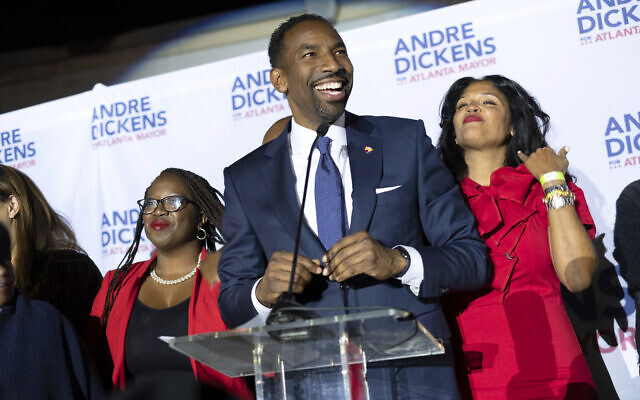Andre Dickens Poised to Become Atlanta Mayor
Unofficial results show city councilman Andre Dickens scoring a decisive victory over Felicia Moore in the runoff.
Dave Schechter is a veteran journalist whose career includes writing and producing reports from Israel and elsewhere in the Middle East.
As the 61st mayor of Atlanta, Andre Dickens will take charge of a city afflicted by a spike in crime, short of sufficient affordable housing, plagued by near legendary traffic congestion, with one of the nation’s highest rates of income inequality, and facing the possible loss of its wealthiest enclave.
As he declared victory Tuesday night, having decisively defeated Felicia Moore in a runoff, Dickens said, “This work will start right now.”
As of midnight, the 47-year-old Atlanta native and city council member led Moore by a margin of 63.6 percent to 36.4 percent. The Associated Press called the race in Dickens’s favor shortly after 10.30 p.m.
With all Fulton County precincts reporting, Dickens held 63.1 percent of the vote. Fulton County accounts for 90 percent of Atlanta residents. In the smaller DeKalb County section of the city, Dickens led with 65.5 percent of the vote.
Turnout of registered voters in Fulton County was shy of 17.5 percent and a shade less than 7.5 percent in DeKalb County.
In the race for city council president — as of midnight on Nov. 30 — Doug Shipman led Natalyn Archibong, 54 percent of the vote to 46 percent.
Dickens told his supporters: “I’m humbled that you have put this faith in me to be the city’s next leader.” He will succeed Mayor Keisha Lance Bottoms, who announced in May that she would not seek a second term.
Before the Nov. 2 general election, polling and prognostications suggested that the next mayor would be either Moore, the president of the city council, or former two-term Mayor Kasim Reed.
Moore, who was elected to the council in 1997 and as council president in 2017, led the 14-candidate, nonpartisan field with 40.8 percent, short of the majority needed to win the race outright. Dickens earned the second slot in the runoff by receiving 23 percent of the vote, to Reed’s 22.4 percent.
Between the general election and the runoff, momentum gradually swung in Dickens’s direction. He received endorsements from Bottoms, former Mayor Shirley Franklin, former Mayor Andrew Young, and U.S. Rep. Nikema Williams, among many.
Dickens was elected in 2013 to represent At-Large Post 3 on the city council and was re-elected in 2017. He has been an executive with TechBridge, a non-profit focused on issues related to poverty.
Dickens received a bachelor’s degree in chemical engineering from the Georgia Institute of Technology (Georgia Tech) and a master’s degree in public administration from Georgia State University in 2013.
During the campaign, Dickens said that, as part of his SAFE Streets Atlanta plan, he would hire 250 new police officers, improve training techniques to include racial sensitivity and de-escalation techniques, and engage in community policing.
As of October, Atlanta had recorded a 14 percent increase in the number of homicides, compared with the same period last year. In 2020, homicides increased 62 percent and aggravated assaults 15 percent, compared with 2019.
In an October poll conducted by the University of Georgia School of Public and International Affairs — commissioned by the Atlanta Journal-Constitution — 47.9 percent of respondents identified crime as “the most pressing issue currently facing the City of Atlanta,” followed by affordable housing at 26.2 percent.
On the latter subject, Dickens told the Atlanta Civic Circle and Saporta Report: “We need to build or preserve 10,000 units of affordable housing in the next four years, and I will hire a Chief Housing Officer to oversee those efforts. They will be tasked with pursuing more affordable options especially around our transit centers, but also with preserving affordable homes through senior property tax freezes and no-cost renovations.”
Perhaps the thorniest issue Dickens will face is the proposed secession of Buckhead from the city, a movement primarily spurred by the issues of crime and taxes. Buckhead covers about 18 percent of the city of Atlanta’s land area and accounts for more than 40 percent of its assessed property value. Secession would cost the city an estimated $232 million in tax revenues.
Creating the proposed Buckhead City would require the Georgia General Assembly and the governor to approve legislation that would put a referendum on the Nov. 8, 2022, ballot.
The 2020 Census reported a 19 percent increase in the city of Atlanta’s population since 2010, to nearly 500,000. African American population growth has been outpaced by that of whites, Asian Americans, and Hispanics. An analysis by the AJC pegged the African American population at 47 percent of the city, the first time in recent decades that Blacks have not been the majority.
- Andre Dickens
- News
- Local
- Dave Schechter
- Mayor Keisha Lance Bottoms
- Atlanta
- affordable housing
- traffic congestion
- Felicia Moore
- Runoff
- Fulton County
- DeKalb County
- Doug Shipman
- Natalyn Archibong
- city council president
- Kasim Reed
- Shirley Franklin
- Andrew Young
- Nikema Williams
- Techbridge
- poverty
- Georgia Institute of Technology
- Georgia state university
- SAFE Streets Atlanta
- Crime
- University of Georgia School of Public and International Affairs
- Atlanta Civic Circle and Saporta Report
- Buckhead
- Georgia General Assembly
- Governor Brian Kemp




comments